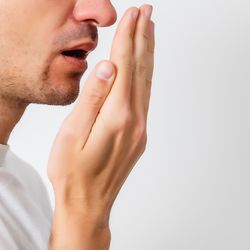
Bad breath. Nobody wants it, and sometimes it can be nearly impossible to tell we have it. That makes treating bad breath especially difficult. But if you do know you have bad breath or suspect you might, then the mystery can revolve around why you have it – and how to get rid of it.
Bad breath is definitely a tricky problem. The first issue is diagnosing what’s behind that foul odor emanating from your mouth. Is it your diet? A medication you may be taking? Poor oral hygiene? Do you smoke or consume alcohol? These are just a few culprits that could be behind your bad breath.
To figure out why you have bad breath, take a closer look at your lifestyle. Do you eat a diet heavy in garlic, onions, or spicy foods? This could be a contributing factor to your bad breath.
Another problem? Smoking. Smoking not only has a distinctly unpleasant odor, but it’s also bad for your teeth and gums and can contribute to health problems like tooth decay and gum disease – both of which can contribute to bad breath.
Medications can sometimes cause bad breath by causing xerostomia, or dry mouth. A dry mouth can cause the mouth to be stagnant, and lower the mouth’s ability to rinse away bits of food and harmful plaque bacteria in the mouth. These bacteria can contribute to cavities and gum diseases such as gingivitis and periodontitis.
Poor oral health practices are another possible cause of bad breath. When plaque, bacteria, and food particles linger in our mouths, this can cause a foul odor and bad breath.
So, what can you do if you suffer from bad breath? There are several options that work hand in hand to cure this dilemma. The first solution is taking good care of the teeth and gums. This can be done by brushing regularly (two times a day, for a minimum of two minutes each time), flossing, using mouthwash and brushing your tongue.
In between brushing, consider sugar-free breath-freshening mints and sugarless gum. If you suffer from a dry mouth, look for a moisturizing mouthwash, or speak to Dr. Abelar about your options.






